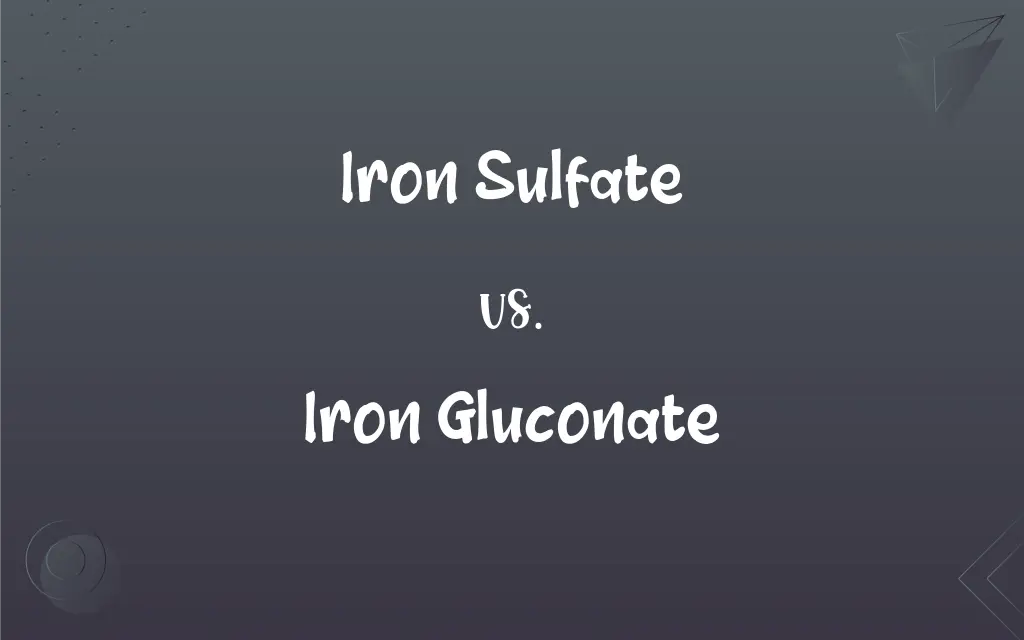Iron Sulfate vs. Iron Gluconate: What's the Difference?
Edited by Harlon Moss || By Janet White || Published on December 25, 2023
Iron sulfate is a common inorganic iron supplement, while iron gluconate is an organic iron compound used for similar purposes but with different absorption rates and side effects.

Key Differences
Iron sulfate, an inorganic form of iron, is commonly used to treat iron deficiency anemia. Iron gluconate, an organic iron salt, offers a gentler alternative with fewer gastrointestinal side effects.
In terms of bioavailability, iron sulfate is well-absorbed but may cause stomach upset and constipation. Iron gluconate provides a lower iron concentration but is typically easier on the digestive system.
Iron sulfate supplements are often recommended for quick replenishment of iron stores. Iron gluconate, being milder, is preferred when patients experience intolerance to iron sulfate.
The cost and availability of iron sulfate make it a go-to option for iron supplementation. Iron gluconate, while more expensive, is favored for its lower incidence of side effects.
In medical formulations, iron sulfate is frequently found in higher-dose tablets. Iron gluconate is commonly available in both tablet and liquid form, providing flexibility for different patient needs.
ADVERTISEMENT
Comparison Chart
Chemical Nature
Inorganic iron salt
Organic iron compound
Bioavailability
High, but may cause gastrointestinal issues
Lower, but gentler on the stomach
Use in Anemia
Often first choice for severe deficiencies
Used when iron sulfate is not tolerated
Cost and Accessibility
Generally cheaper and widely available
More expensive, available in various forms
Typical Formulations
Higher dose tablets
Tablets and liquid forms
ADVERTISEMENT
Iron Sulfate and Iron Gluconate Definitions
Iron Sulfate
Iron sulfate is a supplement used to treat iron deficiency.
The doctor prescribed iron sulfate to address her anemia.
Iron Gluconate
Iron gluconate is known for its higher gastrointestinal tolerance.
Iron gluconate is preferred by those who experience side effects from stronger iron supplements.
Iron Sulfate
It's an inorganic iron source in tablet form.
Iron sulfate tablets are a common over-the-counter remedy for low iron levels.
Iron Gluconate
Iron gluconate is an organic iron supplement.
She switched to iron gluconate due to its milder impact on her stomach.
Iron Sulfate
Iron sulfate serves as a colorant in inks and paints.
Historically, iron sulfate was used to make iron gall ink.
Iron Gluconate
It's used in fortifying foods and beverages.
Some cereals are fortified with iron gluconate to increase their nutritional value.
Iron Sulfate
Iron sulfate aids in red blood cell production.
Taking iron sulfate helped improve his hemoglobin levels.
Iron Gluconate
It's used to treat mild to moderate iron deficiencies.
For his mild anemia, iron gluconate was the doctor's recommendation.
Iron Sulfate
It's used in agriculture to correct iron chlorosis in plants.
Iron sulfate is effective in greening up yellowing lawns.
Iron Gluconate
Available in both oral and injectable forms.
Iron gluconate injections are an option for those who can't tolerate oral supplements.
FAQs
How do they differ in absorption?
Iron sulfate is well-absorbed but may cause side effects, while iron gluconate is gentler but less concentrated.
What is iron sulfate?
An inorganic iron salt used as a supplement.
Which is more likely to cause gastrointestinal issues?
Iron sulfate has a higher likelihood of causing such issues.
Is iron gluconate better for sensitive stomachs?
Yes, it's often recommended for those with gastrointestinal sensitivity.
Do they interact with other medications?
Yes, both can interact with certain medications and should be taken as advised by a doctor.
What is iron gluconate?
An organic iron compound used in supplements.
Can both treat iron deficiency anemia?
Yes, they are both effective for this purpose.
Is iron sulfate suitable for vegetarians?
It depends on the specific product formulation.
Which is more cost-effective?
Iron sulfate is generally cheaper.
Are there any natural sources of these supplements?
They are synthesized compounds, not found naturally in foods.
Are there any age restrictions?
Dosage and suitability vary with age and health condition.
Are they available in the same forms?
Iron sulfate is typically in tablet form, while iron gluconate comes in tablets and liquid.
Can they be taken on an empty stomach?
Iron sulfate is often recommended with food to minimize side effects; iron gluconate may be gentler on an empty stomach.
What are the overdose risks?
Overdose can be serious for both, requiring medical attention.
Can either be used in pregnancy?
Yes, but under medical supervision.
How long should one take these supplements?
Duration varies based on individual iron levels and medical advice.
Can iron gluconate be used in children?
Yes, but dosage should be carefully determined by a pediatrician.
How quickly do they work?
Iron sulfate may replenish iron stores faster, but individual responses vary.
Can lifestyle changes reduce the need for these supplements?
A diet rich in iron can help, but supplements may still be necessary for some individuals.
Can they cause constipation?
Iron sulfate is more likely to cause constipation.
About Author
Written by
Janet WhiteJanet White has been an esteemed writer and blogger for Difference Wiki. Holding a Master's degree in Science and Medical Journalism from the prestigious Boston University, she has consistently demonstrated her expertise and passion for her field. When she's not immersed in her work, Janet relishes her time exercising, delving into a good book, and cherishing moments with friends and family.
Edited by
Harlon MossHarlon is a seasoned quality moderator and accomplished content writer for Difference Wiki. An alumnus of the prestigious University of California, he earned his degree in Computer Science. Leveraging his academic background, Harlon brings a meticulous and informed perspective to his work, ensuring content accuracy and excellence.






































































